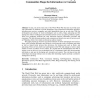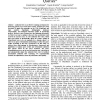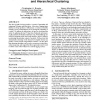195 search results - page 19 / 39 » The structure of broad topics on the web |
104
click to vote
JUCS
2006
14 years 11 months ago
2006
: To date, one of the main aims of the World Wide Web has been to provide users with information. In addition to private homepages, large professional information providers, includ...
110
click to vote
WWW
2008
ACM
16 years 14 days ago
2008
ACM
Easy reuse and integration of declaratively described information in a distributed setting is one of the main motivations for building the Semantic Web. Despite of this claim, reu...
210
click to vote
ICDE
2008
IEEE
16 years 1 months ago
2008
IEEE
Authority flow is an effective ranking mechanism for answering queries on a broad class of data. Systems have been developed to apply this principle on the Web (PageRank and topic ...
WWW
2006
ACM
16 years 14 days ago
2006
ACM
Tags have recently become popular as a means of annotating and organizing Web pages and blog entries. Advocates of tagging argue that the use of tags produces a 'folksonomy&#...
109
click to vote
WEBI
2009
Springer
15 years 6 months ago
2009
Springer
Understanding query reformulation patterns is a key step towards next generation web search engines: it can help improving users’ web-search experience by predicting their inten...



